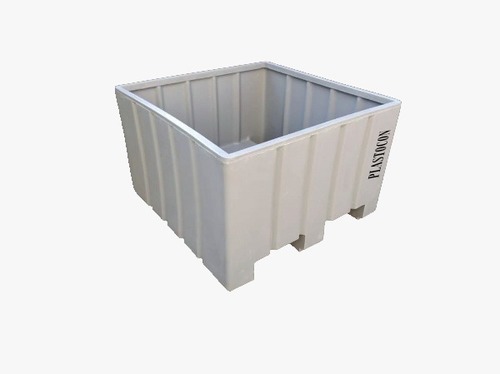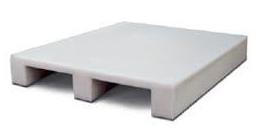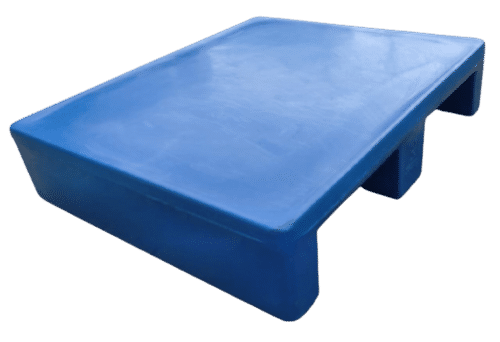
Plastic Pallet Containers (Two Way)
6250 INR/Piece
Product Details:
- Handlift 2-way
- Forklift 2-way
- Color White
- Entry Type 2-Way
- Usage & Applications Industrial
- Eco Friendly YES
- Material Plastic
- Click to view more
X
Plastic Pallet Containers (Two Way) Price And Quantity
- 10 Piece
- 6250 INR/Piece
Plastic Pallet Containers (Two Way) Product Specifications
- 2-way
- White
- 2-Way
- 2-way
- Plastic
- Industrial
- YES
Plastic Pallet Containers (Two Way) Trade Information
- 200 Piece Per Month
- 2-3 Days
Product Description
Plastic pallet containers, also known as plastic bulk containers or plastic bulk boxes, are large, heavy-duty containers designed for the storage, handling, and transportation of goods in bulk. These containers are commonly used in industries such as manufacturing, agriculture, pharmaceuticals, and logistics for their durability, versatility, and efficiency.
Here are some key features and benefits of plastic pallet containers:
Material and Construction:
- Plastic Construction: These containers are typically made from high-density polyethylene (HDPE) or polypropylene, which makes them durable, resistant to chemicals, and easy to clean.
- Reinforced Structure: Many plastic pallet containers are reinforced with steel or fiberglass to enhance their structural integrity, making them suitable for heavy-duty applications.
Design and Dimensions:
- Collapsible/Foldable: Some plastic pallet containers are collapsible or foldable, allowing for efficient storage when not in use. This feature saves space during return transport or when the containers are not in use.
Standard Sizes: They come in standard sizes compatible with pallet racking systems and handling equipment.
Features:
- Lids and Doors: Many models have lids and access doors for easy loading, unloading, and accessing contents.
- Ventilation: Ventilation options are available to allow airflow, which is beneficial for certain types of products.
- Stackability: Designed for efficient stacking when full or collapsed, optimizing storage space.
Hygiene and Cleanliness: Easy to Clean: The smooth surfaces of plastic containers make them easy to clean and sanitize, meeting hygiene standards for industries such as food and pharmaceuticals.
Durability and Longevity: Resistance to Elements: Plastic pallet containers are resistant to moisture, chemicals, and most environmental conditions, ensuring the longevity of the container and protection of its contents.
Cost-Efficiency:
- Reusable: Being reusable and durable, plastic pallet containers provide a cost-effective solution over time compared to single-use packaging options.
- Reduced Damage: The robust construction minimizes the risk of damage to goods during handling and transport
- Recyclability: Many plastic pallet containers are recyclable, and some companies are increasingly using recycled materials in their manufacturing processes.
- Reduced Waste: Reusable nature reduces the need for single-use packaging, contributing to waste reduction initiatives.
Plastic Pallet Containers FAQ:
1. What are plastic pallet containers, and how are they different from other types of containers?
Ans: Plastic pallet containers are large, heavy-duty containers made from materials like high-density polyethylene (HDPE) or polypropylene. They are designed for the storage, handling, and transportation of goods in bulk. Unlike traditional wooden pallets, plastic pallet containers offer durability, resistance to environmental elements, and are often collapsible for space-saving.
2. What industries commonly use plastic pallet containers?
Ans: Plastic pallet containers find applications in various industries, including manufacturing, agriculture, automotive, retail, pharmaceuticals, healthcare, food and beverage, logistics, waste management, textiles, electronics, construction, and recycling.
3. What sizes are available for plastic pallet containers?
Ans: Plastic pallet containers come in standard sizes, typically ranging from 40 x 48 inches to 48 x 48 inches. The height can vary, and there are also collapsible models that can be folded when not in use.
4. Are plastic pallet containers recyclable?
Ans: Many plastic pallet containers are recyclable, and some manufacturers use recycled materials in their production. It's essential to check the specific recycling information provided by the manufacturer.
5. How do plastic pallet containers contribute to cost efficiency?
Ans: Plastic pallet containers are reusable, providing a cost-effective solution over time compared to single-use packaging options. Their durability also reduces the risk of damage to goods during handling and transport, further contributing to cost savings.
6. Can plastic pallet containers be used in cleanroom environments?
Ans: Yes, plastic pallet containers are suitable for cleanroom environments, especially those designed with smooth surfaces that are easy to clean. They are commonly used in pharmaceutical and healthcare industries where hygiene is critical.
7. What features can plastic pallet containers have?
Ans: Plastic pallet containers can have features such as lids, access doors, ventilation options, and collapsible/foldable designs. The choice of features depends on the specific needs of the industry and the type of goods being transported or stored.
8. Are plastic pallet containers suitable for international shipping?
Ans: Yes, plastic pallet containers are often designed to meet international shipping standards. They are compatible with various handling equipment and can be used in global supply chain logistics.
9. How do plastic pallet containers contribute to sustainability?
Ans: Reusable nature, recyclability, and the use of recycled materials in manufacturing contribute to the sustainability of plastic pallet containers. They help reduce the environmental impact associated with single-use packaging.
10. Can plastic pallet containers be customized?
Ans: Yes, manufacturers often offer customization options for plastic pallet containers, allowing businesses to tailor the containers to their specific needs. Customizations may include size variations, color choices, and additional features.
Tell us about your requirement

Price:
Quantity
Select Unit
- 50
- 100
- 200
- 250
- 500
- 1000+
Additional detail
Mobile number
Email










 Send Inquiry
Send Inquiry Send SMS
Send SMS Call Me Free
Call Me Free
 English
English Spanish
Spanish French
French German
German Italian
Italian Chinese (Simplified)
Chinese (Simplified) Japanese
Japanese Korean
Korean Arabic
Arabic Portuguese
Portuguese